I've had a bunch of tasks and a mid-afternoon meeting, so I didn't get a chance to read all of these yet:
Finally, close to me, after the lovely Grafton Pub closed last August, the Old Town School of Folk Music stepped in to buy the space. But that plan has hit a snag after a higher bidder emerged.
I made a note to myself a while ago that as of today I've had a fitness tracker for 3,000 days. Sadly, my past self got it wrong: I got my first FitBit 3,029 days ago. Oopsi.
But it did give me a moment to check my lifetime stats. They don't suck. As of yesterday:
- Total days: 3,028
- Total steps: 40,490, 400
- Total distance: 34,076.1 km
- Goal hit (10,000 steps): 2,771
- Minimum hit (5,000 steps): 3,025
- Mean daily steps & distance: 13,372, 11.3 km
- Median daily steps: 12,770, 10.6 km
- Best 7-day period: 171,122 (7-13 July 2018)
- Best 30-day period: 537,798 (2-31 July 2018)
Not bad. And I'm still getting about 12,000 a day on average, even into my decrepitude.
About 7,000 a day, though it won't hurt to do 10,000:
[T]wo studies, which, together, followed more than 10,000 men and women for decades, show that the right types and amounts of physical activity reduce the risk of premature death by as much as 70 percent.
But they also suggest that there can be an upper limit to the longevity benefits of being active, and pushing beyond that ceiling is unlikely to add years to our life spans and, in extreme cases, might be detrimental.
[A]t 10,000 steps, the benefits leveled off. “There was a point of diminishing returns,” said Amanda Paluch, an assistant professor of kinesiology at the University of Massachusetts Amherst, who led the new study. People taking more than 10,000 steps per day, even plenty more, rarely outlived those taking at least 7,000.
Both studies pinpoint the sweet spot for activity and longevity at somewhere around 7,000 to 8,000 daily steps or about 30 to 45 minutes of exercise most days. Doing more may marginally improve your odds of a long life, Dr. O’Keefe said, but not by much, and doing far more might, at some point, be counterproductive.
I get about 13,000 per day, in part because of Cassie. Which seems fine, according to the report. Note that neither study actually found a causal link between steps and health; the effects only appear related.
The New York Times throws cold water on a health fad:
According to Dr. I-Min Lee, a professor of epidemiology at the Harvard T.H. Chan School of Public Health and an expert on step counts and health, the 10,000-steps target became popular in Japan in the 1960s. A clock maker, hoping to capitalize on interest in fitness after the 1964 Tokyo Olympic Games, mass-produced a pedometer with a name that, when written in Japanese characters, resembled a walking man. It also translated as “10,000-steps meter,” creating a walking aim that, through the decades, somehow became embedded in our global consciousness — and fitness trackers.
But today’s best science suggests we do not need to take 10,000 steps a day, which is about five miles, for the sake of our health or longevity.
A 2019 study by Dr. Lee and her colleagues found that women in their 70s who managed as few as 4,400 steps a day reduced their risk of premature death by about 40 percent, compared to women completing 2,700 or fewer steps a day. The risks for early death continued to drop among the women walking more than 5,000 steps a day, but benefits plateaued at about 7,500 daily steps. In other words, older women who completed fewer than half of the mythic 10,000 daily steps tended to live substantially longer than those who covered even less ground.
Another, more expansive study last year of almost 5,000 middle-aged men and women of various ethnicities likewise found that 10,000 steps a day are not a requirement for longevity. In that study, people who walked for about 8,000 steps a day were half as likely to die prematurely from heart disease or any other cause as those who accumulated 4,000 steps a day. The statistical benefits of additional steps were slight, meaning it did not hurt people to amass more daily steps, up to and beyond the 10,000-steps mark. But the extra steps did not provide much additional protection against dying young, either.
I've hit 10,000 steps 139 days in a row, but I have to keep that up through December 31st to tie my record of 312 days. In fact, in the last year, I've hit the goal 345 times, and since getting a Fitbit in October 2014, I've hit the goal 91.4% of the time. Will it kill me to stop after 9,000 steps? No. But it's an easy goal to understand and to work towards.
I've already done 8 km of walks this morning, and tomorrow I'm doing another 9. (Tomorrow's will end at Sketchbook Brewing, so I'll be even more motivated.) After being cooped up at home and forced to get my daily steps bundled up like the Michelin Man for a few weeks, I feel a bit liberated. The sidewalks are almost all clear (except for a few buildings whose owners suck, like the Cagan Management-run apartments near me), it's already 8°C outside, and the sky is crystal-clear. Tomorrow we might get a little rain before 9am but the afternoon looks absolutely gorgeous.
Spring hasn't officially begun yet, but it sure feels like it.
What a bizarre year. Just looking at last year's numbers, it almost doesn't make sense to compare, but what the hell:
- Last year I flew the fewest air-miles in 20 years; this year, I flew the fewest since the first time I got on a commercial airplane, which was during the Nixon Administration. In January I flew to Raleigh-Durham and back, and didn't even go to the airport for the rest of the year. That's 1,292 air miles, fewer than the very first flight I took (Chicago to Los Angeles, 1,745 air miles). I did, however, make an overnight trip to Wisconsin in November, easily breaking the record for my longest travel drought but making it shorter than never.
- This is my 609th post on the Daily Parker in 2020—an average of more than 50 per month. This new record blows away the one I set just last year by 10.5%. (Imagine how much I'd have written had anything newsworthy actually happened in 2020.)
- The pandemic let me spend Parker's last eight months with him nearly every day. Despite his age and discomfort, we managed to go for almost 241 hours of walks (274 annualized), a whopping 29% (46% annualized) more than in 2019.
- Including today, I got 4,848,171 steps, averaging 13,246 per day. This is 5.7% fewer than last year. I missed 10,000 steps on seven occasions—five this month. Without a daily commute or a dog, not to mention the cold weather, I have struggled since Thanksgiving to get motivated enough to get longer walks in. That said, I hit a new record of 312 consecutive days over 10,000 steps, a record I don't anticipate ever breaking. I also got 56,562 steps on September 4th—another record I don't expect to break soon.
- I once again read more than the year before, with 39 books started and 37 completed. (I'm still working on The Power Broker, which I started 18 months ago...) On the other hand, I watched 59 movies and 79 TV series, compared with 56 and 38 respectively in 2019. Of course, almost all of that was streaming on my home computer while programming on my work computer, but it's a lot.
I can't even predict what will happen in 2021. I expect fewer steps, more books, and actually to start traveling again. Here's hoping for a speedy vaccination.
After 312 days in a row exceeding 10,000 steps, yesterday I fell asleep after dinner with only 9,624 on my Veno. I even did a 5.7-kilometer walk around my neighborhood. Oops.
In a way, though, I'm a little relieved. Maybe I can be a bit lazy for a couple of days before starting another streak of 300+ days?
I wore both my old Fitbit Ionic and new Garmin Venu for about 42 hours straight. Yesterday they overlapped for the entire day. And they came in with similar, but not quite the same, numbers.
I thought that my Fitbit would record fewer steps overall, because it recorded about 450 (about 7%) fewer on my walk yesterday. For the whole day, though, the Fitbit counted 14,190 to the Garmin's 13,250—7% more. But I wore the Fitbit on my right (dominant) wrist, so it may have just had more activity in general.
In other basic measures:
- The Fitbit recorded 13.3 km to the Garmin's 10.6 km;
- The Fitbit estimated my resting heart rate as 64 to the Garmin's 65;
- Fitbit counted 82 "active" minutes to the Garmin's 359 "moderate" and 369 "vigorous";
- Fitbit estimated my calorie burn at 3,100 to Garmin's 2,862.
I have no way to know which tracker was more accurate, but I might bet a dollar on the Garmin. I think the Garmin used actual distance to the Fitbit's estimate based on my usual stride length, which doesn't account for all the difference.
The Garmin's app presentation is so far beyond Fitbit's I wonder whether Fitbit even has software developers. Here's Fitbit:
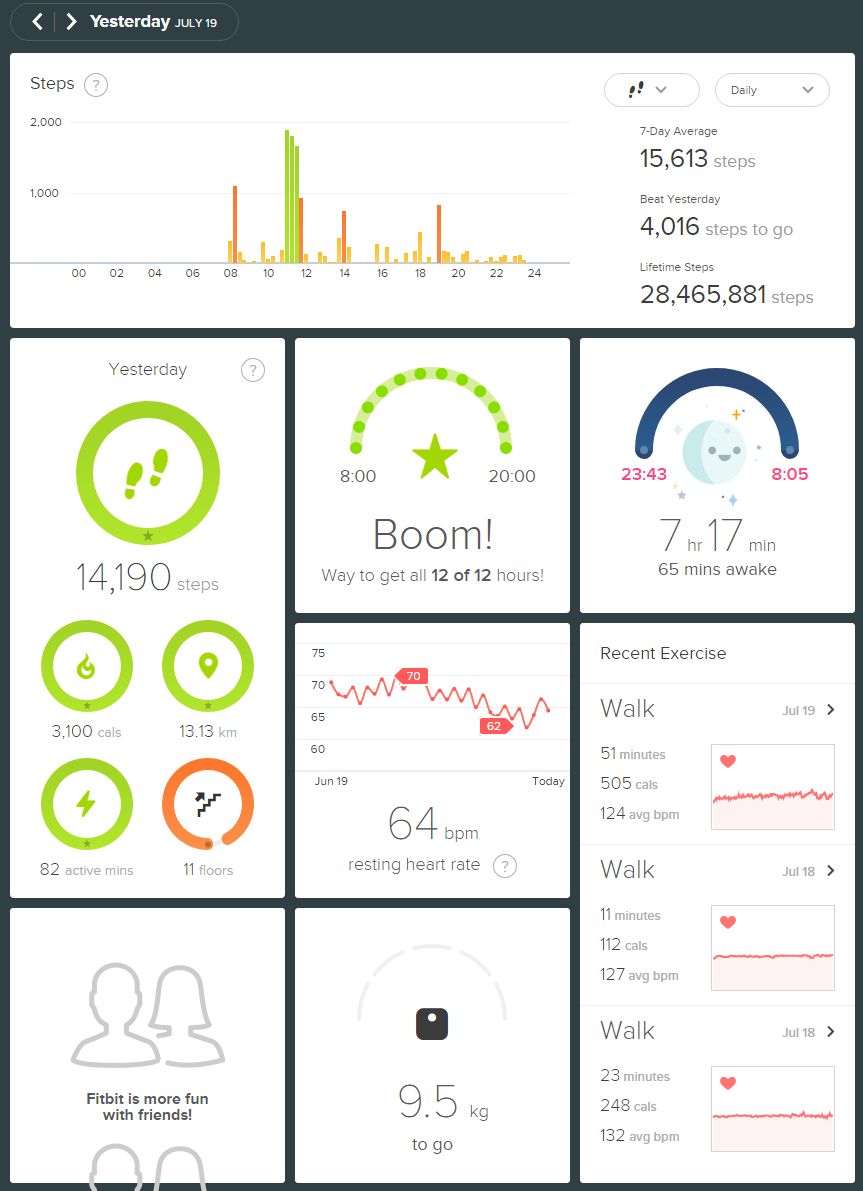
Here's Garmin's:
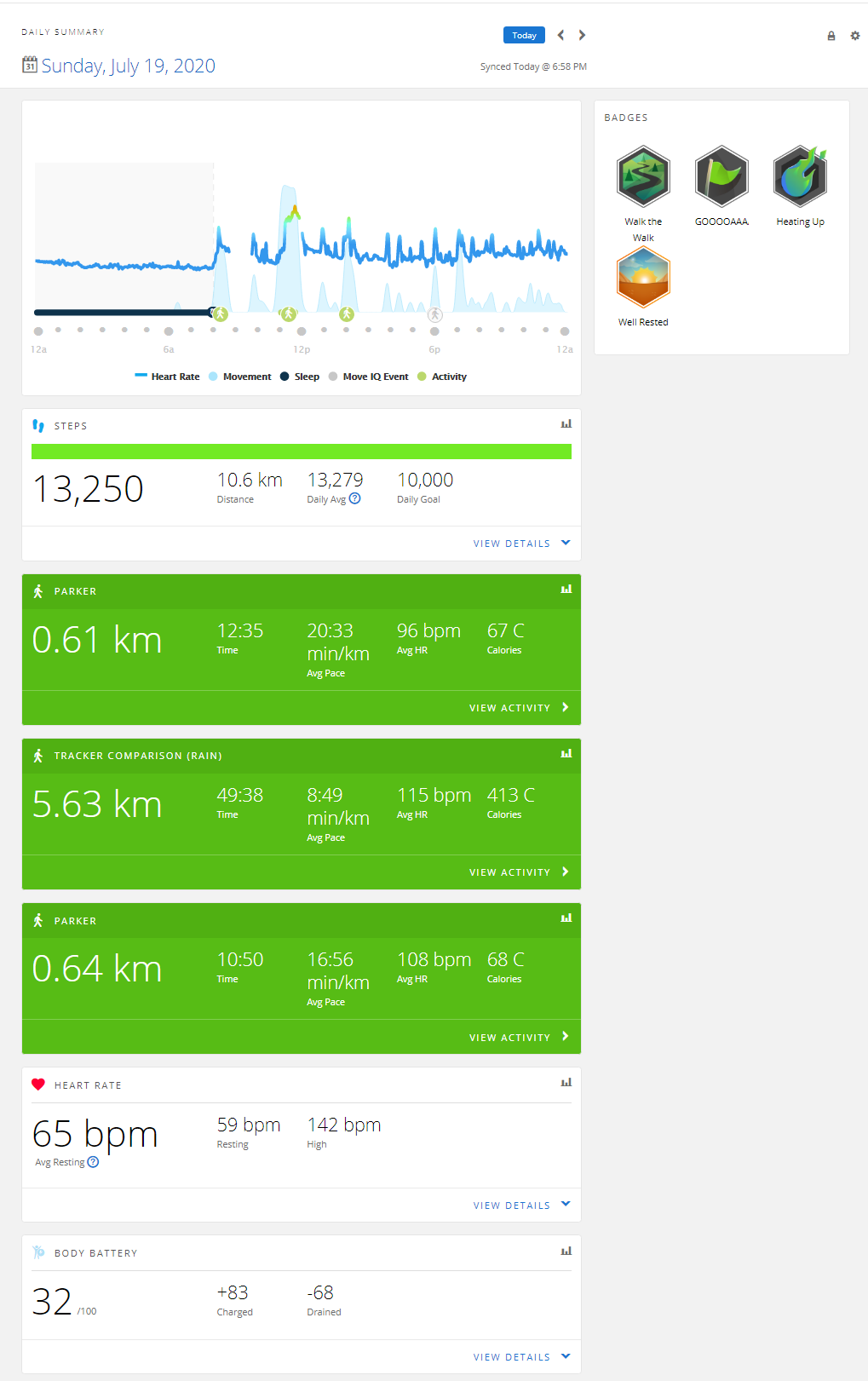
And that's not even all of the Garmin data.
I walked halfway home after work today, and once again, the Garmin tracked my workout better than the Fitbit has done in months.
I'm glad I switched.
I'll get to the final head-to-head comparison between my Garmin Venu and Fitbit Ionic later today. Meanwhile:
And finally, because our Covid-19 numbers have started creeping up, indoor bar service will halt on Friday.
Before I get to the technical bits comparing the Garmin Venu (now on my left wrist) to the Fitbit Ionic, let me just list some "learnings" today:
- Both trackers are waterproof as advertised, as is my phone.
- I am glad that I keep a towel by my back door.
- I am glad that my washing machine—and, let's face it, my dryer—is by my back door.
- There comes a point where one's clothes have absorbed so much water that it really doesn't matter how much more water they will encounter.
I have no one to blame but myself. This is the radar picture 10 minutes into the walk:
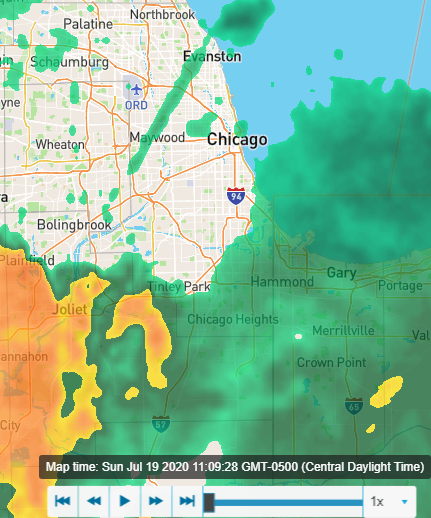
And 40 minutes in:
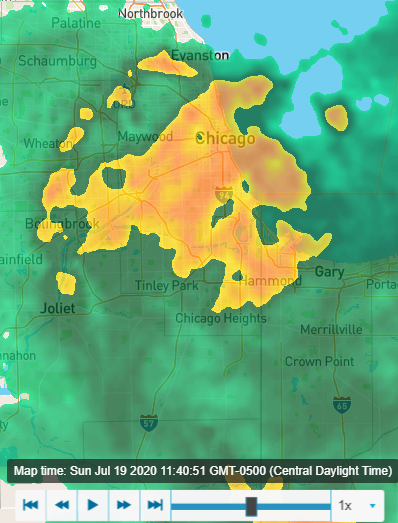
Result:

But enough about me. This post is really about fitness trackers.
In sum, the main difference between the Garmin and the Fitbit remains the Fitbit's total GPS failure, and the paucity of data Fitbit provides on its app compared with Garmin.
Here's the Fitbit data:
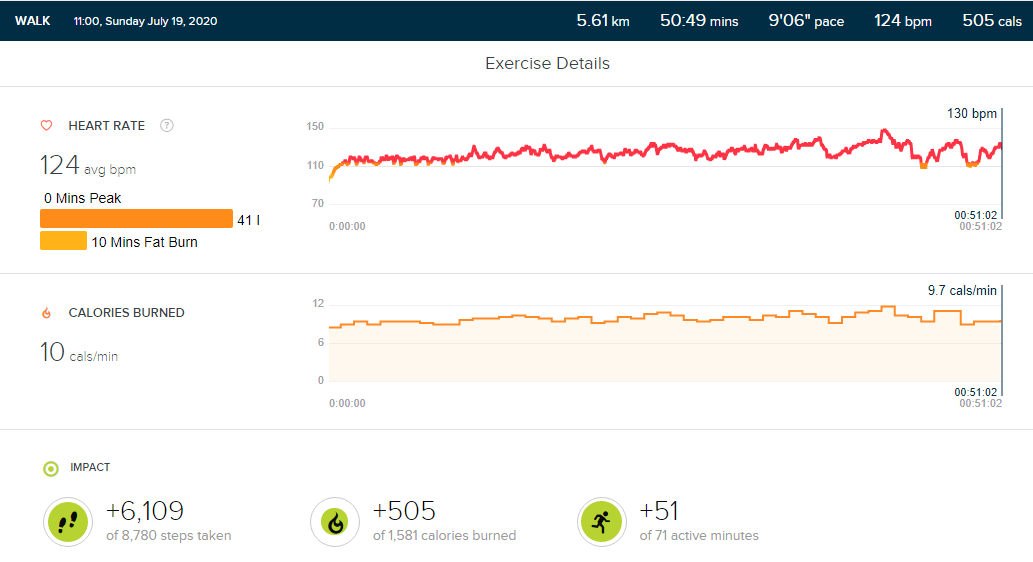
And the Garmin data:
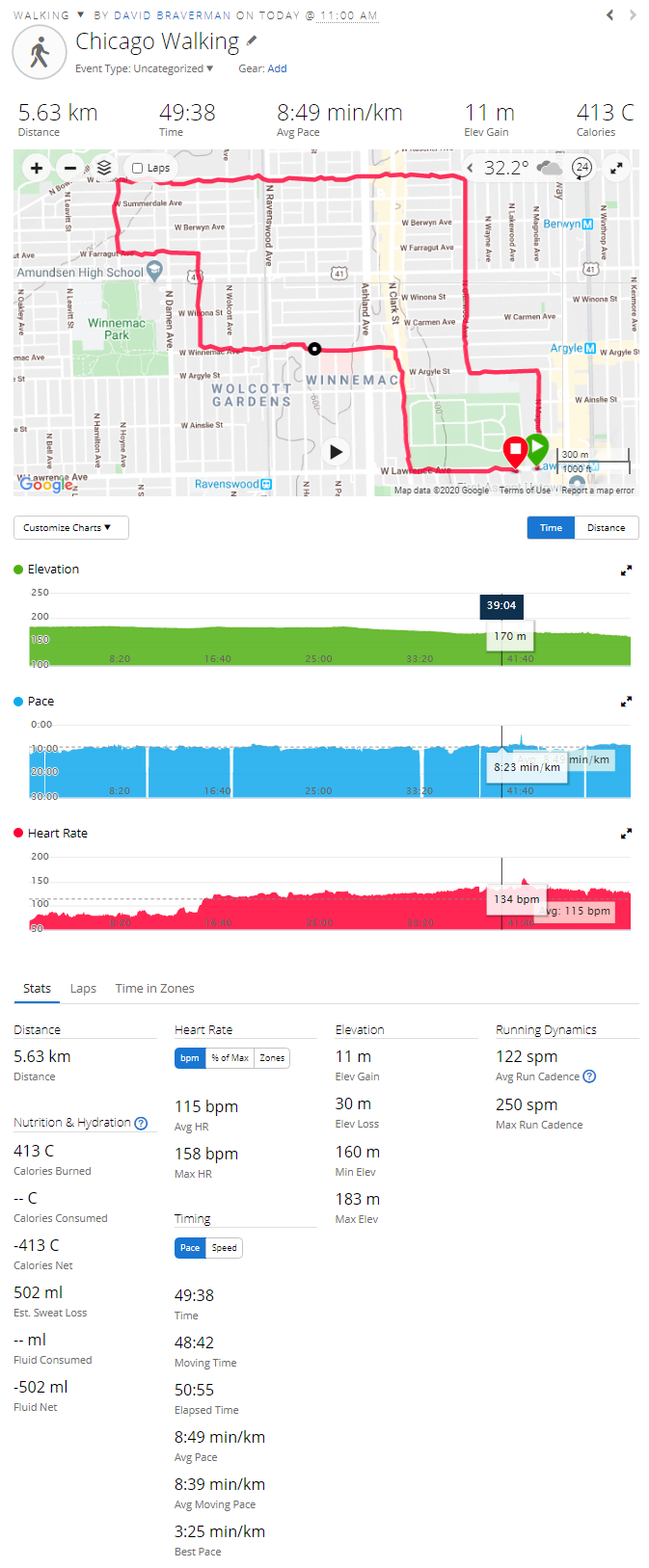
I am pleased, however, that both trackers got almost exactly the same distance, given that the Garmin tracked distance using actual data and the Fitbit guessed based on my stride length. They don't agree on how many calories I burned, how many steps I took: the Garmin said 6,556, while the Fitbit said 6,109. So far today, my Garmin says 9,127 to Fitbit's 9,047, which adds data to my hypothesis that my Fitbit has always under-counted.
So, other than the rain, I thought this test went well.